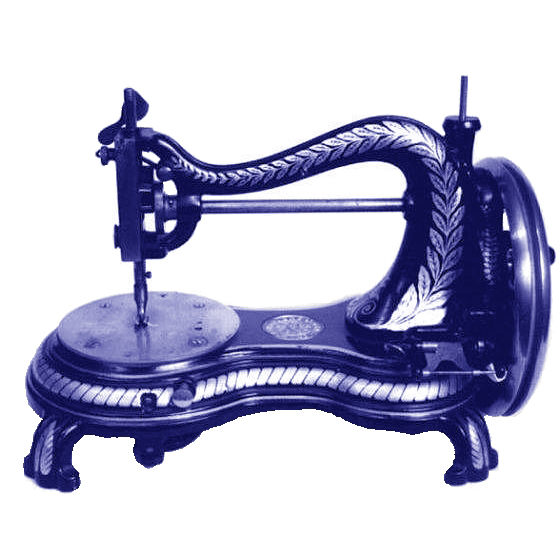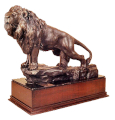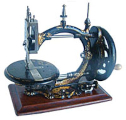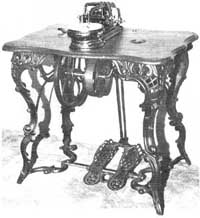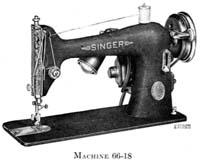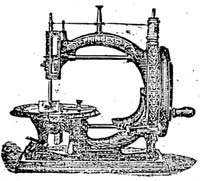Weir's Millions
MORE information has come to light on the enterprising James Galloway Weir - we quote first from an obituary in the Sewing Machine & Cycle Gazette for 1 June, 1911.
"Yet another celebrity in the history of the sewing-machine trade passed away at the age of 72, on May 18, in the person of James Galloway Weir, MP.
"He died at his residence, Frognal, Hampstead, London, after a three-days' illness and following a paralytic stroke.
"To the present generation of the trade Mr. Weir's name is all but unknown, but older men will readily recall him as having made a larger fortune out of sewing machines in the short space of 10 years than any other British subject.
"He has been described in the general press as a sewing-machine inventor, but if this means that he has showed high mechanical originality it is quite a misnomer. Mr. Weir was certainly an inventor, but it was exclusively in a commercial and financial direction.
"In the early '70s he secured the agency for the chain-stitch machine invented and manufactured by Charles Raymond of Canada, changed the name to "Weir" and so boomed it that it sold at 55s "like hot cakes".
"We believe we are right in stating that he made an average profit on these machines of 30s each, and that he sold not fewer than 50,000 of them from his warehouse in Carlisle Street, Soho, WC, inside 12 years, and then retired from business.
"Mr. Weir was a Lowland Scotsman, and in 1885 he unsuccessfully contested, in the Liberal interest, Falkirk Burghs, and later, in 1892, he was elected for Ross and Cromarty, which constituency he represented at the time of his death.
"Although not a Highlander, Mr. Weir especially applied himself to the interest of the crofters. He was particularly known for asking questions of the Government, and cared little whether he offended or pleased his party so long as he felt that his questions would serve a useful purpose.
"According to some MPs he was a bore - not being a fluent speaker, his style being conversational. Yet he was highly respected by both parties as a man who was always sincere in his actions.
"Mr. Weir was buried on May 22 in the Marylebone Cemetery, after a service which was held at the St Andrew's Presbyterian Church, Hampstead, which was attended by representatives of several political bodies.
"The chief mourners were his wife and Miss Margaret McLaren Weir, his daughter by the second marriage, also Miss Edith Weir, the only surviving daughter by the first marriage. Funeral dirges were played by boy pipers from the Caledonian Asylum."
This obituary led to a former Weir employee writing to the Gazette and from his letter we can fill in some of the blanks in the Weir history and discover, for the first time, the location of the factories.
The correspondent, who worked for Weir for many years, informed the Gazette that the paper had "much understated the trade done by the deceased". Instead of his total sales being 50,000 for the 10 years the business lasted, they were nearer a quarter of a million. "His net profits must have exceeded £200,000".
The letter continues:
"When Mr. Weir ceased to buy his machines from Raymond, of Canada, he got them made by Goodwin of Paris. Later on he made them in his own factories, first in Belmont Street, NW, and next in larger premises in Ferdinand Place, NW.
"The demand for the Weir machine during its first eight years was tremendous, due in no small degree to the fact that lockstitch machines were then high in price and not so pleasing in appearance as the little chainstitch Weir.
"Another reason for its success was the smart system of advertising adopted and the keen business acumen of Mr. Weir, not to forget the fact that he had to assist him several smart men to whom he paid substantial salaries.
"At this period there were but few sewing-machine travelers, and drapers and other traders in every town in the United Kingdom clamored for agencies. It thus came about that Mr. Weir did an extensive wholesale trade.
"The retail price of the machine was £2 15s, and agents could obtain them at £1 18s 6d if ordering six at a time, at £1 13s 4d for larger quantities, and if 1,000 were ordered the price was £1 10s. All accounts had to be settled monthly.
"The Weir machine cost to produce 13s 3d, then there was a charge of 9d for a box and the price of needles was 3s 6d per dozen.
"A considerable trade was done in accessories, as much as 5s being charged for a binder. These figures will show that Mr. Weir made a huge profit out of his sales. Then his expenses were very low. The headquarters were in Carlisle Street, Soho, and the rent was but trifling.
"During the first year or two of the Weir business, it was a common sight to see as many as eight carriages in Carlisle Street, the lady owners of which were absolutely pleading of Mr. Weir to let them take away one of his machines.
"These ladies frequently went away empty-handed, because it was next to impossible to keep a stock, and orders had to be executed in rotation. A single post would sometimes contain orders for machines from 200 people.
"Mr. Weir in the later '70s commenced to do a credit trade, but on very safe terms, viz: £1 down and 10s a month. Of course the rush for the Weir chainstitch machine did not last long, merely about five years, by which time the public demanded lockstitch machines and this caused Mr. Weir to make the "Zephyr" which sold at 4 guineas, but the demand for this was not very great, and having made a huge fortune, Mr. Weir gave up his business which, from first to last, only existed 10 years".
